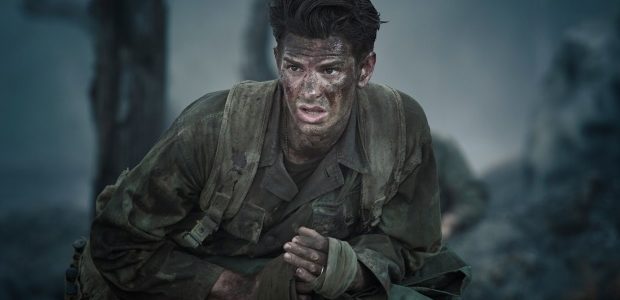It’s been ten years since Mel Gibson made those alleged anti-Semitic remarks. That’s about the same time Gibson has been looking for work as a director in Hollywood. But hypothetically speaking, if Gibson were to throw down the gauntlet against the likes of Spielberg, this is how one would imagine him doing it.
Hacksaw Ridge is not only Gibson’s best film since Braveheart, it is also the best war film since Spielberg’s Saving Private Ryan. As an actor and a director, Gibson’s symbiosis with cinema has almost always been about self-sacrifice and patriotism. In that tradition, Hacksaw Ridge is one of the most moving films on heroism and the second reason why this film is a must-see. Despite countless films on World War II, this is an original yet true story that has never been told before. Comprising of an ensemble cast, the film opens over the vistas of Blue Ridge Mountains, Virginia, where we are first introduced to Desmond Doss (Andrew Garfield) and the estranged relationship with his alcoholic and WWI veteran father Tom (Hugo Weaving). It’s a pivotal part of the story that would ultimately determine the decisions Doss would make after enlisting in the war. This is also where Doss falls head over heels for local nurse Dorothy (Teresa Palmer) and promises to marry her as soon as he returns. All this feels a little clichéd, and given the setting, a bit like the love story in Michael Bay’s Pearl Harbor.
The next part is the boot camp segment and essentially where the narrative kicks in some humour, ala R. Lee Ermy styled commanding officer played by Vince Vaughn. Doss is immediately branded a coward for refusing to touch a rifle. Not even platoon Captain Glover’s (Sam Worthington) discriminatory threats will smudge Doss’ belief in never taking a life. This only means that Doss must work harder and disprove his CO’s ranting that “a unit is only as strong as its weakest member”. As an unlikely soldier, what Doss manages to do during the rest of the film is absolutely incredible but not before Gibson is let loose with a ravenous appetite for violence.
We’ve seen what Gibson did to the character of Jesus in The Passion of the Christ, and going by that reputation, this should come as a fair warning for the queasy that there is no shortage of gore, guts, and severed limbs in this film. In taking the fight to blood soaked trenches in Okinawa, it suddenly dawns on the audience how and why the word ‘Hacksaw’ was coined in Japanese territory. Even so, carnage although graphic is somehow poetic and a first for Gibson. That’s largely due to the seasoned cast and the attention given when they are introduced, resulting in ample reason to root for them. Led by the charismatic Garfield, each character is sympathetic, brave and sometimes even funny which gives Gibson’s broad strokes an emotional undertone when we see them getting picked off before knowing what hit them.
Many will tout this film as Mel Gibson’s comeback vehicle. While this may be partly true, the film in its entirety is a well-crafted ode to selfless courage infused with reverence for divinity. For what has mostly been a bad year in cinema, 2016 seems to be sprouting, albeit late in the year but closer to Oscar season, with films devoted to real life heroes. Sully was one of them. If Desmond Doss was eventually venerated with the Congressional medal of Honour and all without firing a single bullet, Hacksaw Ridge could prove to be Gibson’s atonement in as much as his return to form.
Rating: 




